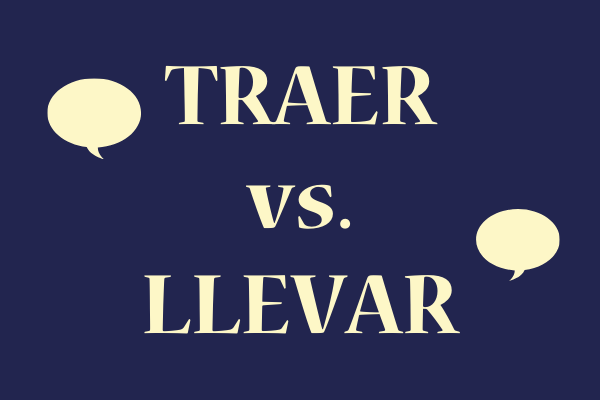Traer vs. Llevar
Spanish is a funny thing. So many words and expressions directly translate to, or are almost the exact same word in English, and with a little Spanish accent addition (addición) we have the word mastered. However, for all the joy we find with those similar words and translations, there are also many that don’t directly translate or even have completely different meanings. One of these differences is in the use of the verbs traer (to bring) and llevar (to take).
For English (and I’ve learned, French) speakers, the correct use of these two verbs forces us to think about who’s taking or bringing what, where. In English, we can take a snack to a friend’s house or we can bring a snack to our friend’s house. It really doesn’t matter which verb you choose. In Spanish, however, the rule is very clear: You llevar something to a different place. The person receiving it says you are going to traer something to them.
For example, let’s imagine you and your friend are planning a fiesta at your friend’s house and shehe asks you to make a cake. Here’s how the conversation would go:
Amiga: Oye, ¿puedes traer un pastel [a mi casa] para la fiesta?
Yo: Claro que sí. Lo llevo [a tu casa] antes.
Friend: Hey, can you bring a cake [to my house] for the party?
Me: Of course. I’ll take it over [to your house] beforehand.
So, as my friend is hosting the party, she’s asking me to bring (traer) the cake to her house - or to her. I’m at a different location, so I’ll take (llevar) the cake over to her house.This is a bit strange for us to see why there’s a difference in use, but once you begin to think about what’s happening, with practice, it gets easier. It also makes things very clear about what’s going on with the taking and bringing. Unfortunately, until the use is learned, with lots of practice of course, confusion can occur while speaking to a native speaker as they might not understand who’s taking or bringing what where.The easiest way to remember this is: Llevar things there and traer things here. Good luck and I hope you can start practicing this today!
Send an email over to Erica at say@naatikmexico.org to sign up for online Spanish classes or to get on our list for when we reopen to receive immersion students down here in Mexico.
Want more Spanish language tips? Check out our blogs on masculine words ending in ‘-a’ and the difference between te quiero and te amo. Don’t forget to sign up for our newsletter to receive more straight to your inbox every month!

